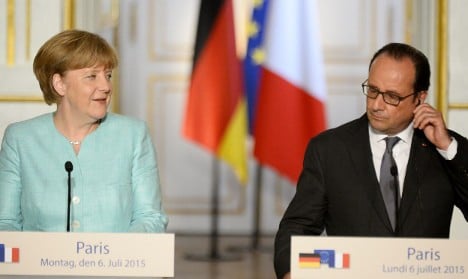ANGELA MERKEL
Hollande and Merkel call for strict refugee quotas
Germany and France have agreed that the European Union, facing a slew of migrant crises, should impose binding quotas on the numbers member states take in.
Published: 3 September 2015 15:39 CEST

German Chancellor Angela Merkel and French President Francois Hollande. Photo: AFP
The French presidency announced the two European powerhouses would send joint proposals to Brussels “for organising the welcome of refugees and their fair distribution in Europe” and for “reinforcing the European asylum system.”
With the large number of refugees and migrants flooding into Europe and moving through the continent, it warned that “dramas are being followed by tragedies.”
“Thousands of victims have died since the start of the year. The European Union must act in a decisive manner in line with its values,” the French presidency said.
It added though that the joint proposals also aim to ensure “the return of irregular migrants to their countries of origin, and bring the necessary support and cooperation with countries of transit and origin.”
German Chancellor Angela Merkel told reporters during a visit in the Swiss capital that the message would be shared with European institutions.
“I spoke this morning with the French president, and the French-German position, which will transmit to the European institutions, is that we agree that … we need binding quotas within the European Union to share the burden. That is the principle of solidarity,”
She insisted the bloc needed to adhere to the basic principle that “those who need protection … get it.”
She said the “economic power and size (of countries) should play a role” in the number of migrants they are asked to take in, but stressed that without quotas, “we cannot solve this problem.”
Merkel said that while Europe has an obligation to help those in need, “those who are coming for purely economic reasons cannot expect a lasting protection and must leave the country.”



 Please whitelist us to continue reading.
Please whitelist us to continue reading.